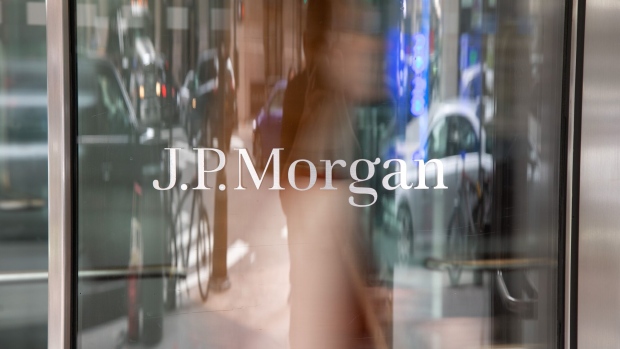Dec 7, 2023
JPMorgan Sees Rates Rally Driving Single-Digit Returns for Bonds
, Bloomberg News

(Bloomberg) -- JPMorgan Chase & Co. is predicting high single-digit returns for US corporate bonds next year, driven by lower bond yields and relatively benign default rates.
In a soft landing scenario, analysts at the bank are predicting 8% returns for investment grade bonds and 9% for high yield bonds, Steve Dulake, global head of credit research at JPMorgan, said at a Bloomberg Intelligence conference on Thursday.
“Lower rates, not spreads, are really driving returns,” Dulake said in a keynote speech at Bloomberg headquarters in New York. “Companies have done a great job at taking advantage of the capital market tailwinds that you’ve seen in place, notably since the Labor Day long weekend holiday.”
The benchmark US high-grade bond index gained 6% in November, the biggest jump on a total return basis since 2008, according to Bloomberg index data. Junk bond investors fared almost as well over the month with positive returns of 4.5%.
JPMorgan forecasts slowing growth in the US, though it will still avoid a recession, with inflation moderating back toward the Federal Reserve’s 2% target. Until roughly six weeks ago, analysts at the bank expected policy rates to begin to ease by about 25 basis points a quarter. They now expect the Fed to essentially cut rates every six weeks, said Dulake.
“We’ve seen a very big drawdown in return potential for next year,” said Dulake. “But we still think actually that you can still achieve high single-digit returns both in high grade and in high yield next year.”
JPMorgan projects high grade net issuance to be on par if not lower than it was this year. Concerns around balance sheet resiliency and refinancing risks have eased as companies have done a good job pushing their maturities out next year and in 2025 back out to somewhere between 2028 and 2030, he said.
He predicts a default rate of below 3% for junk and 3.25% for loans.
“There’s a lot of noise, almost on a daily basis, around the private credit space,” he said. “We would argue, at least from a JPMorgan perspective, that private capital has done a lot to elongate the current credit cycle.”
Dulake’s biggest concern is potential volatility in the rates market considering that the US Treasury is engaged in selling securities into the marketplace.
“In terms of what really shakes the tree, I think it could be interest rate volatility, particularly as we get into supply periods next year and government bond auctions,” he added.
©2023 Bloomberg L.P.






